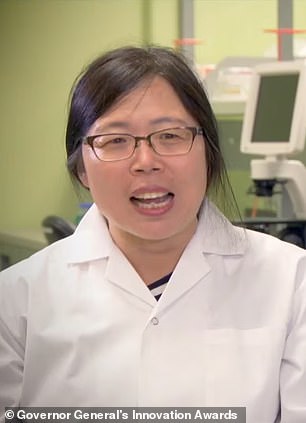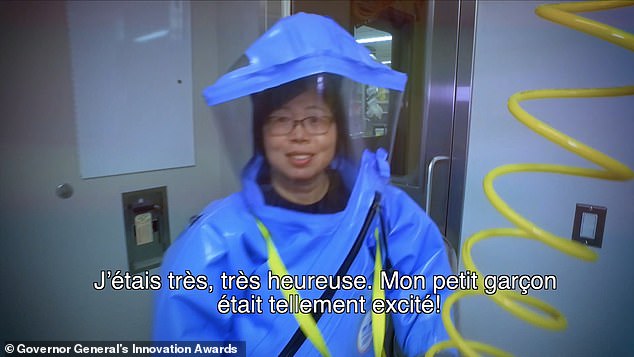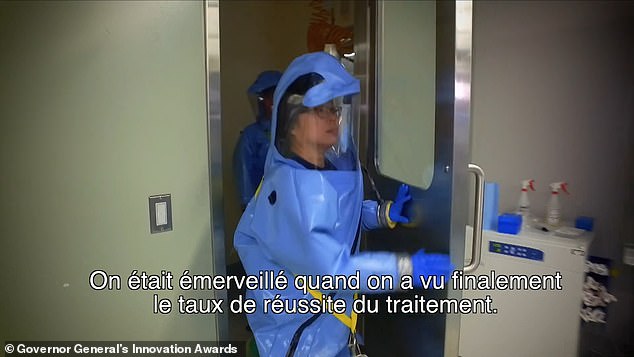Canadian lab treating world’s deadliest viruses tightens security after investigation shows researchers with connections to Chinese government and military gained access and mailed live Ebola virus to Wuhan
A Chinese couple working at Canada’s top biosafety laboratory secretly sent information to Beijing and live-mailed Ebola to China, an investigation has found.
In a 600-page report released this week by Canadian intelligence, the pair were also accused of allowing visitors into the laboratory who tried to leave with plastic bags containing vials containing an unknown substance.
Dr. Xiangguo Qiu and Dr. Keding Cheng were found to have left visitors with ties to the Chinese government and military unattended at the facility.
The report also accused the pair of being in communication with the Wuhan Institute of Virology, the facility at the center of the Covid laboratory leak theory, without informing their superiors.
The Canadian National Microbiology Lab in Winnipeg, Manitoba, where they worked as researchers, is the only BSL4 laboratory in the country – and the only one where Ebola is found, as well as other deadly viruses such as Marburg and Lassa fever.
It has now been ordered to tighten security over the breach, with universities told that their funding could be cut if they are found to be working with foreign institutions – such as those in China.
The Chinese couple had worked at the Canadian National Microbiology Lab (pictured) in Winnipeg, Manitoba. It is the only BSL4 laboratory in the country authorized to handle dangerous pathogens, including Ebola and Marburg viruses


The couple, Dr. Xiangguo Qiu (left) and Dr. Kending Cheng (right), are pictured above. Both are now believed to be in China
The Canadian government led by Prime Minister Justin Trudeau has been fighting for years to keep the Canadian Security Intelligence Services (CSIS) investigation secret, according to media reports.
The CSIS initially released a heavily redacted version of the investigation in 2021, but this sparked outrage from the conservative opposition and accusations of a cover-up.
This week they were forced to release the documents after a national security review by a special parliamentary committee and a panel of three retired senior judges.
The review claimed that the couple could have used the laboratory as a ‘foundation to help China improve its ability to combat highly pathogenic pathogens… and achieve brilliant results’.
Dr. Qiu, a native of China, was a “star” at the internationally renowned laboratory for her work developing an antibody treatment against Ebola, which was used in the 2014 outbreak in Africa.
But in July 2019, she and her husband were escorted from the lab and then fired from their positions without official explanation in January 2021.

Dr. Qiu is pictured above working in the laboratory. Researchers said she sent the genetic code for Ebola to the Wuhan Institute of Virology (WIV).

Dr. Qiu, who worked at the lab, was also found to have lied to officials about a vacation she took to China in 2018 and that he had appeared on two Chinese patents without the lab’s knowledge.
In its newly released 2020 assessment, the CSIS warned: “Dr. Qiu represents a very serious and credible threat to the government of Canada as a whole.
“And particularly at facilities that are considered highly secure due to the potential for theft of dangerous materials that are attractive to terrorists and foreign entities conducting espionage to infiltrate and harm Canada’s economic security.”
The assessment added: ‘The agency assesses that Ms. Qiu has developed deep, cooperative relationships with a variety of institutions of the People’s Republic of China (PRC).
“(She also) deliberately transferred scientific knowledge and materials to China to benefit the government of the People’s Republic of China, and herself, without regard to the implications… for Canada’s interests.”
Officials on Dr. Qiu’s violation list said she provided Beijing with “the genetic sequence of Ebola, which opened an easy door for China.”
They also accused her of sending the Ebola virus to the WIV, including documents in their report showing that the shipment had been sent.
She was also accused of sending the Henipavirus to the WIV in the form of a shipment of 30 vials in total.
Additionally, they claim she was contracted to work for the WIV during a trip to China in 2018 – which she claims was for “personal reasons.”
And Dr. Qiu was found to have brought two restricted visitors to the laboratory, including a research assistant at Beijing’s Academy of Military Sciences and a woman carrying a Chinese public affairs passport reserved for civil servants.
The report also claims that Dr. Qiu was a candidate for Beijing’s Thousand Talents Program, which was set up to pay students to participate in research to advance Chinese interests.
And it is alleged that between 2018 and 2022, she negotiated an employment contract with Hebei Medical University in Shijiazhuang, China. The unfinished deal would have paid the equivalent of $1.2 million to support her work.
The agency also alleged that she and her husband had a secret bank account at China Commercial Bank and that she had applied to participate in a program at China’s WIV. As part of this, she had committed to “building the People’s Republic of China’s biosafety platform for new and vigorous infectious disease research.”
Concerns about Dr. Qiu were first raised in September 2018 when her name appeared on a patent filed in China for a treatment against Ebola – research about which the laboratory had not yet been informed.
The source of the tip has not been disclosed.
Suspicions then arose about Dr. Cheng in October after it emerged that he had invited students into the laboratory who tried to leave with two clear plastic bags containing vials of an unknown substance.
Later that same month, Dr. Cheng also caught trying to leave the lab with two empty Styrofoam containers, which BSL-4 labs use to transport materials including viruses.
Concerned by the reports, the Public Health Agency of Canada (PHAC) launched an investigation into the couple – who revealed numerous allegations of security flaws against the pair, including that they had repeatedly allowed restricted visitors to download experimental data from the lab and send it to their email accounts.
The PHAC also alleged that Dr. Cheng had received vials of mouse protein in May 2018 in a package shipped from China and labeled as “kitchen utensils.”
Dr. Qiu was accused of sending Ebola antibodies from the laboratory to countries including China, the US and the UK for at least two years.
She was also accused of being named on a second patent in China covering a treatment for the Marburg virus.
Alarmed by their findings, the investigation was then handed over to the CSIS just before July 2019, who launched their own security investigation – and interviewed the couple.
Health Minister Mark Holland said China’s influence on Canada’s scientific community was “not known to the extent it is today,” following the release of the files.
‘These were eminent scientists whose research and work were well known. They were leaders in their field, some of the smartest scientists we knew,” he said.
“I think there was a nascent understanding of the extent to which foreign actors in the most direct sense – we’re talking China in this case, Russia in other cases and other foreign entities, foreign governments – were trying to influence Canada.”
The couple could not be contacted and numerous media reports have suggested they have moved to China.
